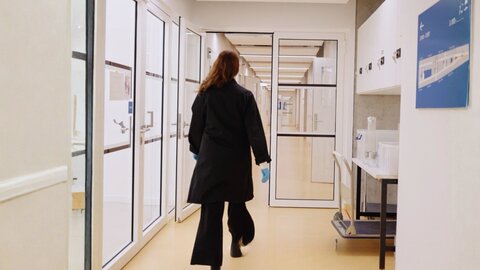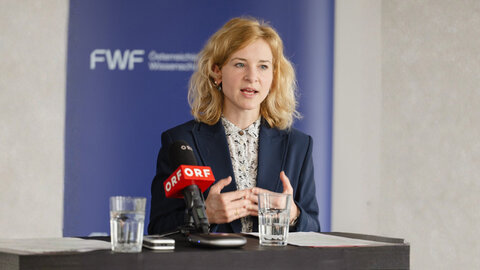Working in cutting-edge research: fixed-term contracts, workload, and career goals
Slightly over half of the surveyed researchers are in fixed-term employment; especially for women in general and employees under the age of 40, fixed-term contracts are the norm rather than the exception. Older researchers often have longer contracts of up to 36 months, while younger employees are subject to shorter terms. The workload increases with age, regardless of gender. Respondents resport devoting almost half of their working time to research, followed by teaching, administration, supervision, and third-party funding acquisition. Scientists at non-university research institutions have more time available for research compared to their university colleagues. The time spent on acquiring third-party funding remains constant at about 8% as compared to previous surveys.
While almost 90% of those surveyed aspire to a permanent position in the academic field, they give themselves a relatively sobering 25% chance of achieving this. This illustrates the development potential for career prospects in the field of science, especially for early-stage researchers.
Availability of third-party funding increases the attractiveness of the location
A significant proportion of research activities in Austria are financed using third-party funding. It is part of researchers’ everyday life to have to raise all or at least part of their research budget by acquiring third-party funds. One-third of respondents reported sourcing almost all of their own research budget from third-party funding; on average, they estimate that just under 65% of their own research budget is based on research funding. Austria’s most important address for funding applications in basic research is naturally the FWF, which is why it is well known within the scientific community. The majority of the researchers surveyed have also submitted a funding application to the FWF at some point – the more advanced their career, the broader the range of funding organizations they have had contact with at national and European levels.
Demand far higher than supply
Respondents judged the ratio of application effort to potential return for various funding agencies differently. Applications at the European level are rated as high-effort in comparison to the potential yield. For the FWF, the result is somewhat more moderate, but also double-edged: Half of the respondents find the effort involved rather high or very high. This assessment is probably also related to the high rejection rates due to the FWF’s lack of budgetary means.
Early-stage researchers struggle with uncertain career prospects
Early-stage researchers struggle primarily with the problem of uncertain career prospects: Eight out of ten postdocs in all scientific disciplines have doubts about their career prospects in academia. In addition, long qualification processes, non-competitive income opportunities, and hierarchical structures that negatively impact self-employment are cited as critical career factors.
There is a clear gap between the status quo and the target with regard to performance appraisal criteria. Academic publications are currently the decisive criterion for most respondents, who view this positively and don’t want it to change. According to the surveyed researchers, other currently decisive criteria are successfully acquired third-party funding and internal networks. According to the survey, researchers would like these aspects to be less important. Compared to the status quo, teaching, science communication, and social relevance should play a much greater role in performance assessment.
The role of supervisors and mentors is primarily viewed positively. Junior researchers are encouraged to be independent and there is openness and a willingness to allow younger researchers to develop their own scientific profile. Support for long-term career planning was the one area where supervisors were given lower scores.
Precarious career development as a permanent uncertainty factor
Around two thirds of researchers are (very) satisfied with their job. Aspects that are viewed more critically are the professional position, teaching activities, and especially work-life balance. The latter is viewed more critically by women of all ages than by their male counterparts. Although many respondents expressed overall satisfaction with their professional situation, half of the researchers surveyed have recently considered leaving academia. These thoughts are disproportionately strong among people in their twenties and thirties. Regardless of gender, the survey results show three decisive factors: “Temporary nature of the job” and “Serial short-term contracts,” which affect all age groups, but are even more unsatisfactory for researchers under the age of 30, and “Uncertain career development,” which causes doubt between the ages of 30 and 49.
Experiences with discrimination and scientific integrity
One in four respondents reported witnessing or experiencing discrimination in the workplace (due to gender, ethnic origin, age); women experience discrimination more often than men. Over half of all respondents reported observing violations of academic integrity, especially problems related to authorship.
The academic system: Desired reforms and areas of strength
The Spectra survey highlights the most pressing issues and where researchers believe there is a need for reform in the academic system: By far the most important issues with the broadest support are increasing the number and type of permanent positions below professorships, stronger promotion of open science, more extensive opportunities for time off for research, and the implementation of flatter hierarchies. The Austrian science system was given the best marks for autonomy and freedom of research (75% excellent or good). The social relevance of research, performance in international comparison, and innovative capacity, while still good, received slightly lower grades. Appreciation by society is reported to be lacking by many respondents.
Positive feedback on the FWF’s administration of funding and quality of support services
The quality of the information, guidelines, and support provided during the application process is rated very positively by the majority of respondents. There is room for improvement in the transparency and understandability of grounds for rejections, especially in view of the low approval rates – an issue that the FWF will be focusing on more closely. The majority of respondents find the application process unbureaucratic and the review and decision-making procedures transparent.
Austria’s largest-scale survey of researchers
The 2025 Survey of the Austrian Research Community was conducted in May and June 2025 on behalf of the Austrian Science Fund (FWF) by Spectra Marktforschungsgesellschaft mbH following a competitive bidding process. The results are based on a comprehensive survey of the scientific community in Austria: Of the approximately 20,000 researchers potentially eligible to apply to the FWF, 3,368 scientists completed the questionnaire. Thomas Wolfschluckner, Senior Research Director at Spectra Marktforschungsgesellschaft mbH, is the main author of the study.






